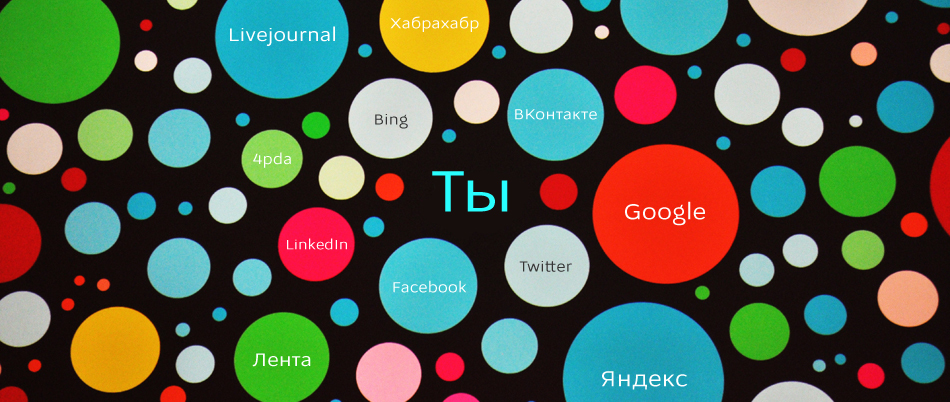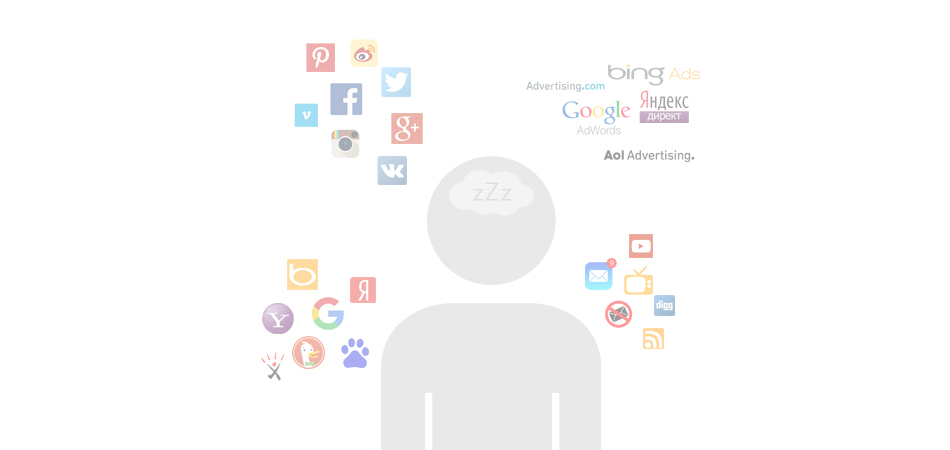What is a “filter bubble” and how to get out of it

Many years ago on Habré there was an article about the so-called “filter bubble” or “filter of interests”. The point is that modern information systems accumulate huge amounts of data about each user, analyze, structure and ultimately decide what information to display. Is this good or bad? How could this threaten? How to control it? Is it necessary to control at all?
All that is interesting and necessary for me to work, I get from the Internet. "The most ordinary Internet user" is me. News, social networks, thematic sites, Google, Yandex - what you use daily. And I guess I'm not alone.
Every day we are inside our mini-Internet, the content of which depends on our search queries, interests, visited sites, viewed videos, liked posts and even a bunch of parameters that are collected and stored. And that this is a vicious circle, almost imperceptible: you feel comfortable, because the links that Google gives are based on your preferences, and in the Facebook feed, there are first posts on an interesting topic ...
Bubble guy
For the above-described "phenomenon" came up with the name - filter bubble (filter bubble). This concept was introduced by Eli Pariser. His main idea is that filtering and personalization limit us from new ideas, important information and make the illusion that our interests are, in fact, all that is interesting in the world around us. And you do not control what information to receive, they have already chosen for you.
As an example of the negative effect of the filter bubble, Eli described a situation where one user entered a British Petroleum query into Google and received only investment news about the company. Another user, sending the same request, received information about the explosion of the Deepwater Horizon oil platform. Anyway, both pages with search results were almost completely different from each other. It turns out that the effect of the bubble can form the wrong public opinion about the situations. And you can use it!
Until I noticed that I was inside my filter of interests, I was really comfortable. Now, there is a desire, if not to get out of it, then at least expand and control. And the truth is, as Cypher from the first Matrix said: "Happiness is in ignorance."

Selecting from the interests filter
It turns out the following situation: on the one hand, personalization and filtering in the same search engines do a good deed: they show what we most often browse, search, discuss. On the other hand: the “picture” is a little distorted, and finding something new becomes more difficult, because search engines will take into account previous requests, history of visits and everything else to produce results.
You can enable the "paranoia mode":
- Use TOR - in addition to TOR, there are other anonymizers that mask your IP address. But be prepared for slower download speeds.
- Work in incognito mode - in all modern browsers there is an “incognito mode”. In this mode, the entered passwords, cookies, cache, search queries and addresses of visited pages are not saved.
- Disable cookie - when cookies are disabled, it will be more difficult to identify you on the network.
- Do not use social networks - if you are logged in to a social network, a "loop" with your data will follow you on other sites. When visiting sites where there are buttons like, sharing, repost and retweets, be sure that Facebook or VKontakte knows where you were and what you watched.
- Wherever you have accounts with personal information, prohibit the transfer of data to partner resources - you may not even know about it, but some services transfer / sell / share data of their users. Permission for this is in the user agreement, "which no one reads." In most cases, this option can be discarded.
- Use blockers - third-party software that monitors the operation of the browser, blocks the loading of ads and the transfer of "unnecessary" requests.
- In general, do not log in anywhere.
- Use pigeon mail, etc.
All of these actions will allow you to slightly depersonalize you online. And you can well get out of your filter bubble, well, or definitely increase it.
But personally, I am not particularly happy with the implementation of all these manipulations. The only more or less convenient option is to put some kind of utility that would prohibit the transfer of hidden requests and remove information noise. Better yet, if it is a browser extension, with a minimum of settings. Actually, I was looking for such a solution, but I haven’t yet found a universal one that would suit me. In the process, I installed and tested various extensions and plugins, for example:
Ghostery- An excellent extension, checks the pages you visit for the presence of third-party elements, as they call them "bugs". These can be social network widgets, ads, invisible pixels, used to track user activity and analytics, etc. All this can be configured and blocked.
Protect My Choices - formerly called Keep My Opt-Outs. It removes targeted ads from pages, but not all, but only those companies that participate in the DDA program. It’s not very suitable for Russia, but it works.
Do Not Track - Adds a special header to each of your HTTP requests. Thanks to this visited site, information is transmitted that you do not need to be tracked. Although in fact, this feature can be enabled in the browser itself :)
Avast Online Security- An extension from Avast antivirus, has the function of blocking various counters, trackers and analytics systems, prevents clicking on unwanted links, etc.
AdBlock is probably one of the most famous browser extensions. AdBlock removes ads from pages. I think that it makes no sense to especially describe the functions of this extension, by and large it is one - the removal of advertising. Also, there are analogues: uBlock, AdBlock Plus, Adguard.
Disconnect is another extension that shows which external resources and services the site connects to and, of course, allows you to block this content. There is an interesting feature for visualizing links.
There are many such extensions and it should be noted that there are no less users of these extensions. This is to say that many are still concerned about the situation with constant monitoring of user actions. In the same article , there are comments about foil hats, paranoia and, in my opinion, there is no need to panic and frantically make a garden of 10 extensions that remove and block everything, access the Internet only through a chain of 25 proxies and gloves. Everything is already known about you. Because: "everything that got on the Internet remains on the Internet." You just need to know this and keep track of what personal information and photos you leave on the sites. In the future, this may not be a good joke with you.

By the way, did you know that on Facebook every hour 250,000,000+ new posts appear? And this is only in one social network, to say nothing about the entire Internet. I ’ll try to write about this next time , about how to get rid of information noise , what other interesting and useful extensions are, their small comparison.
